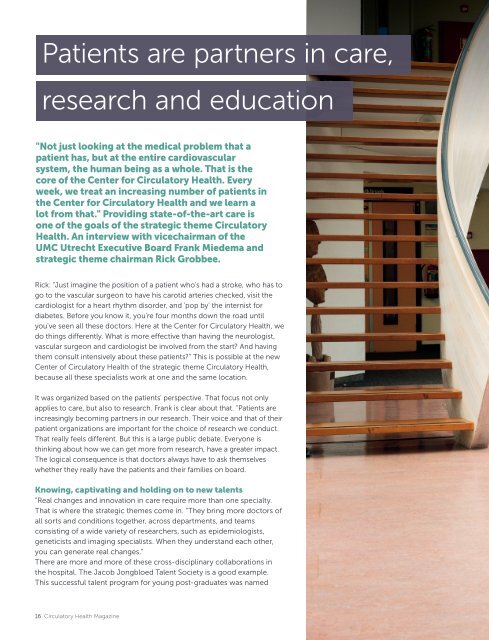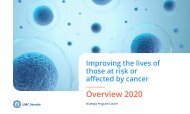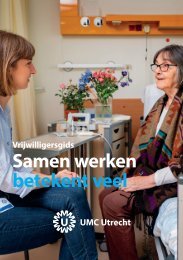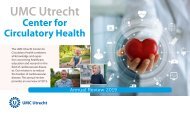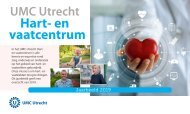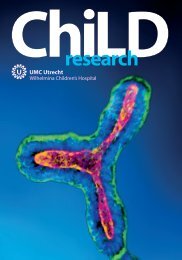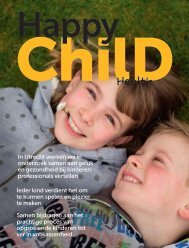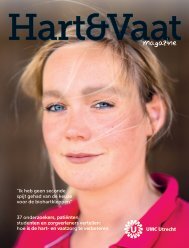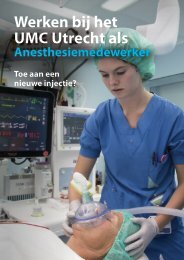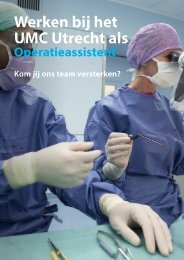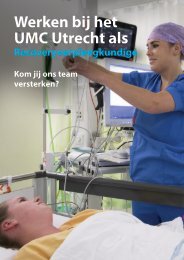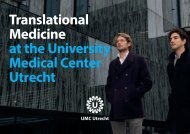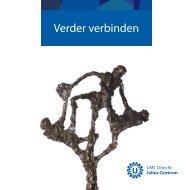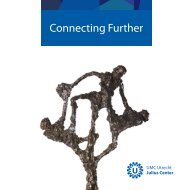Circulatory Health magazine
Create successful ePaper yourself
Turn your PDF publications into a flip-book with our unique Google optimized e-Paper software.
Patients are partners in care,<br />
research and education<br />
"Not just looking at the medical problem that a<br />
patient has, but at the entire cardiovascular<br />
system, the human being as a whole. That is the<br />
core of the Center for <strong>Circulatory</strong> <strong>Health</strong>. Every<br />
week, we treat an increasing number of patients in<br />
the Center for <strong>Circulatory</strong> <strong>Health</strong> and we learn a<br />
lot from that." Providing state-of-the-art care is<br />
one of the goals of the strategic theme <strong>Circulatory</strong><br />
<strong>Health</strong>. An interview with vicechairman of the<br />
UMC Utrecht Executive Board Frank Miedema and<br />
strategic theme chairman Rick Grobbee.<br />
Rick: "Just imagine the position of a patient who's had a stroke, who has to<br />
go to the vascular surgeon to have his carotid arteries checked, visit the<br />
cardiologist for a heart rhythm disorder, and 'pop by' the internist for<br />
diabetes. Before you know it, you're four months down the road until<br />
you've seen all these doctors. Here at the Center for <strong>Circulatory</strong> <strong>Health</strong>, we<br />
do things differently. What is more effective than having the neurologist,<br />
vascular surgeon and cardiologist be involved from the start? And having<br />
them consult intensively about these patients?” This is possible at the new<br />
Center of <strong>Circulatory</strong> <strong>Health</strong> of the strategic theme <strong>Circulatory</strong> <strong>Health</strong>,<br />
because all these specialists work at one and the same location.<br />
It was organized based on the patients' perspective. That focus not only<br />
applies to care, but also to research. Frank is clear about that. "Patients are<br />
increasingly becoming partners in our research. Their voice and that of their<br />
patient organizations are important for the choice of research we conduct.<br />
That really feels different. But this is a large public debate. Everyone is<br />
thinking about how we can get more from research, have a greater impact.<br />
The logical consequence is that doctors always have to ask themselves<br />
whether they really have the patients and their families on board.<br />
Knowing, captivating and holding on to new talents<br />
"Real changes and innovation in care require more than one specialty.<br />
That is where the strategic themes come in. "They bring more doctors of<br />
all sorts and conditions together, across departments, and teams<br />
consisting of a wide variety of researchers, such as epidemiologists,<br />
geneticists and imaging specialists. When they understand each other,<br />
you can generate real changes."<br />
There are more and more of these cross-disciplinary collaborations in<br />
the hospital. The Jacob Jongbloed Talent Society is a good example.<br />
This successful talent program for young post-graduates was named<br />
16 <strong>Circulatory</strong> <strong>Health</strong> Magazine


